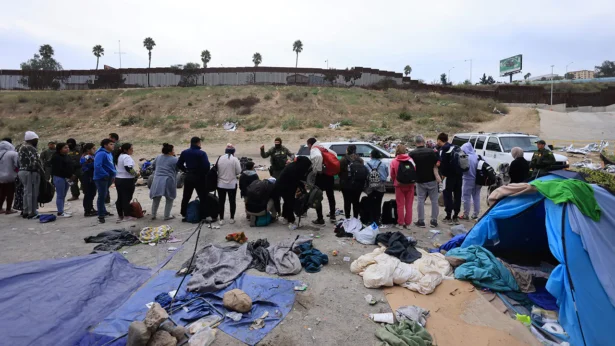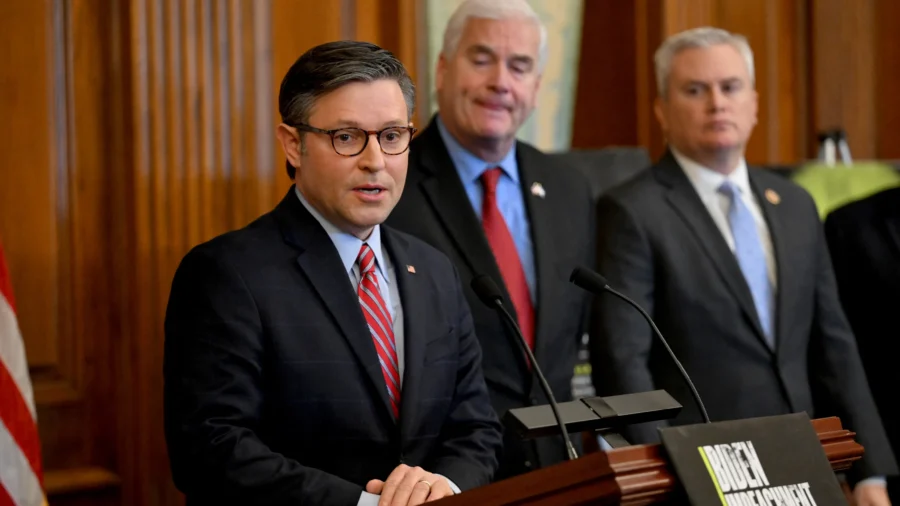The House of Representatives will not approve supplemental military aid to Ukraine unless the Senate agrees to close the open southern border of the United States, Speaker Mike Johnson (R-La.) told a gathering of senators on Nov. 29.
The message highlights the point of contention between Republicans and Democrats over how to handle President Joe Biden’s $106 billion request for supplemental spending on aid to Israel, Ukraine, U.S. border security, and other needs.
Democrats want to pass the entire $106 billion spending package in a single vote.
Republicans would vote on major spending items one by one, ensure that they are paid for, and include benchmarks for border security improvements.
House Republicans have been increasingly skeptical of approving additional spending for Ukraine due to concern that there is too little accountability for how the money is used. They are also frustrated that the Senate has been unwilling to consider H.R. 2, the Secure the Border Act, which the House passed earlier this year.
Mr. Johnson’s message to senators ups the stakes for House passage of Ukraine aid, but it is unclear whether Republicans have enough leverage in the Senate to make it stick.
Republicans aim to make aid for Ukraine conditional upon Senate passage of some version of the provisions of H.R. 2.
“You’d have to be a real optimist to see how this is going to work,” Sen. Mike Braun (R-Ind.), a proponent of beefing up border security, told reporters after the gathering
Sen. J.D. Vance (R-Ohio) worried that any deal between the parties might not be substantial enough to achieve the domestic security aim.
“I’m certainly open to voting for a package if it secures the border, if you get meaningful reductions in the number of illegal crossings,” Mr. Vance told The Epoch Times. “The fear that I have is that … you have facially reasonable but ultimately meaningless changes on border policy, and you get money for Ukraine.”
The president’s request for supplemental spending includes $45 billion in military aid for Ukraine, $14.3 billion in aid to Israel, $13.6 billion for U.S. border security, and $10 billion for humanitarian aid for Israel, Ukraine, Gaza, and refugees entering the United States.
The House approved the $14.3 billion in aid to Israel along with provisions to pay for the expenditure from existing funds. Republicans passed that provision earlier this month with a stipulation that it be paid for from existing funds.
Senate Democrats refused to consider funding Israel separately, saying that it would signal wavering support to other U.S. allies around the world.
As for the portion earmarked for border security, Republicans are concerned that it will be meaningless without some metrics in place to ensure that progress is being made.
Now Republicans have drawn a line in the sand, saying there will be no additional aid to Ukraine until a plan to secure the border, including measurable benchmarks for achieving progress, is signed into law.
Senate Democrats appear to be firm in rejecting that premise, seeing it as imperative to stop the Russian invasion of Ukraine.
“Republicans have to say yes [to the supplemental spending package] at some point,” Sen. Chris Murphy (D-Conn.) told reporters. “I still think there is a mythology inside the Republican caucus that they are going to somehow get H.R. 2 out of this. That is not happening. And it would be a cataclysmic mistake by Republicans to let Vladimir Putin march through Europe because they’re throwing a temper tantrum over not getting their preferred version of border reform.”
Republicans from both chambers have said border security is the top concern of their constituents.

“We’re not going to move forward with any type of funding if we don’t have actual border security. Our base has been very clear about this,” Sen. Markwayne Mullin (R-Okla.) told reporters. “There’s zero chance they’re going to be okay with us having funding for Israel, funding for Ukraine, if we’re not securing our borders.”
Republican senators and members of the House Freedom Caucus echoed that idea at a press conference later on Nov. 29.
“In the Tucson sector, there were 2,700 apprehensions [of illegal immigrants]—2,700 in one sector of the nine southwestern border sectors,” said Rep. Andy Biggs (R-Ariz.). “The sector chief . . . has said we basically have no [agents] patrolling the border today. Why? Because they are all processing and transporting people, and they are inundated. The border is uncontrollably open.”
Rep. Chip Roy (R-Texas) told reporters of an encounter with a constituent from Laredo, Texas, who spoke tearfully of the impact of illegal immigration on his community. “He said, ‘My family is under constant siege back home . . . our state is under constant siege.’”
Sen. Rick Scott (R-Fla.) said, “We have an administration that doesn’t care what the law is. And so if we don’t have metrics, nothing’s going to change.”
From The Epoch Times


